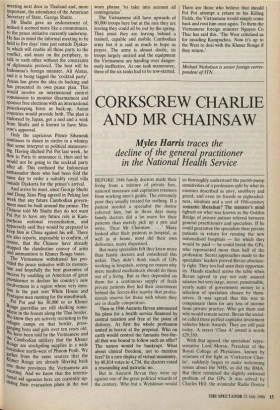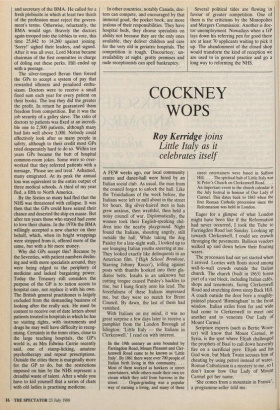CORKSCREW CHARLIE AND MR CHAINSAW
Myles Harris traces the
decline of the general practitioner in the National Health Service
BEFORE 1948 family doctors made their living from a mixture of private fees, national insurance and capitation retainers from working men's guilds. The extremely poor they usually treated for nothing. If a patient needed a specialist the doctor referred him, but in those days many family doctors did a lot more for their patients than merely pick up a pen and write, 'Dear Mr Chainsaw. . . .' Many looked after their patients in hospital, as well as at home, most did their own deliveries, many dispensed.
But many specialists felt they knew more than family doctors and considered this unfair. They didn't think much of GPs working in hospitals, seeing no reason why mere medical mechanicals should do them out of a living. But as they depended on them for a continuous supply of fresh private patients they hid their resentment behind the Jeeves-like suavity that profes- sionals reserve for those with whom they are in deadly competition.
Then in 1946 Aneurin Bevan announced his plans for a health service financed by central taxation and free at the point of delivery. At first the whole profession united in horror at the proposal. Who on earth would control the fantastic free-for- all that was bound to follow such an offer? The nation would be bankrupt. What about clinical freedom, not to mention fees? In a rare display of virtual unanimity, by 40,814 votes to 4,734, the doctors voted a resounding and patriotic no.
But in Aneurin Bevan they were up against one of the great political wizards of the century. Who but a Welshman would so thoroughly understand the parish-pump sensitivities of a profession split by what its enemies described as envy, snobbery and greed, and even its friends as pigheaded- ness, idealism and a sort of 19th-century romantic liberalism? The minister's mind lighted on what was known as the Golden Bridge of private patient referral between general practitioners and specialists. If he could guarantee the specialists their private patients in return for running the new nationalised hospitals — for which they would be paid — he could break the GPs, who represented more than half of the profession. Secret approaches made to the specialists' leaders proved Bevan absolute- ly right. They too had seen their opportun- ity. Hands reached across the table when Bevan agreed to pay not only assured salaries but very large, secret, pensionable, yearly sums of government money to a selection of specialists chosen by them- selves. It was agreed that this was to compensate them for any loss of income from private practice. Who got them and why would remain secret. Bevan the social- ist called these perfect capitalist investment vehicles Merit Awards. They are still paid today. A secret 'Class A' award is worth £29,550.
With that agreed, the specialists' repre- sentative Lord -Moran, President of the Royal College of Physicians, known by veterans of the fight as 'Corkscrew Char- lie', suddenly began to make welcoming noises about the NHS, as did the BMA. But there remained the slightly awkward problem of the GPs. It was solved by Charles Hill, the avuncular Radio Doctor and secretary of the BMA. He called for a fresh plebiscite in which at least two thirds of the profession must reject the govern- ment's terms. Otherwise, reluctantly, the BMA would sign. Bravely the doctors again trooped into the lobbies to vote, this time 25,842 to 14,260 against joining. `Sorry!' sighed their leaders, and signed. After it was all over, Lord Moran became chairman of the first committee in charge of doling out these perks. Hill ended up with a peerage.
The silver-tongued Bevan then forced the GPs to accept a system of pay that rewarded idleness and penalised enthu- siasm. Doctors were to receive a small fixed sum each year for every patient on their books. The less they did the greater the profit. In return he guaranteed them freedom from competition. But it was the job security of a galley slave. The ratio of doctors to patients was fixed at an incredi- ble one to 2,500 patients, although many had lists well above 3,000. Nobody could effectively look after so many people in safety, although to their credit most GPs tried desperately hard to do so. Within ten years GPs became the butt of hospital common-room jokes. Some were so over- worked that they referred patients with a message, 'Please see and treat.' Ashamed, many emigrated. At its peak the annual loss was equivalent to the entire output of three medical schools. A third of my year fled, a fifth to North America.
By the Sixties so many had fled that the NHS was threatened with collapse. It was then that the GPs could have seized their chance and deserted the ship en masse. But after ten years those who stayed had come to love their chains. In the 1970s the BMA willingly accepted a new charter on their behalf, which, when its bright wrappings were stripped from it, offered more of the same, but with a bit more money.
Why did GPs accept this? Because by the Seventies, with patient numbers declin- ing and with more specialists around, they were being edged to the periphery of medicine and lacked bargaining power. Today the Treasury still considers the purpose of the GP is to ration access to hospital care, not replace it with his own. The British general practitioner is largely excluded from the demanding business of looking after the really sick. He must be content to receive out of date letters about patients treated in hospitals in which he has no visiting rights, with instruments and drugs he may well have difficulty in recog- nising. Certainly in the inner cities, close to the large teaching hospitals, the GP's world is, as Mrs Edwina Currie recently said, one of stamp-licking, amateur psychotherapy and repeat prescriptions. Outside the cities there is marginally more for the GP to do, but the restrictions imposed on him by the NHS represent a dreadful waste of talent. After a while you have to kid yourself that a series of chats with old ladies is practising medicine. In other countries, notably Canada, doc- tors can compete, and encouraged by that immoral goad, the pocket book, are more jealous of their responsibilities. They have hospital beds, they choose specialists on ability not because they are the only ones available, they deliver children and care for the very old in geriatric hospitals. The competition is tough. Discourtesy, un- availability at night, grotty premises and rude receptionists can spell bankruptcy. Several political tides are flowing in favour of greater competition. One of them is the criticisms by the Monopolies and Mergers Commission. Another is doc- tor unemployment. Nowadays when a GP lays down his referring pen for good there are at least 70 applicants waiting to pick it up. The abandonment of the closed shop would transform the kind of reception we are used to in general practice and go a long way to reforming the NHS.















































 Previous page
Previous page